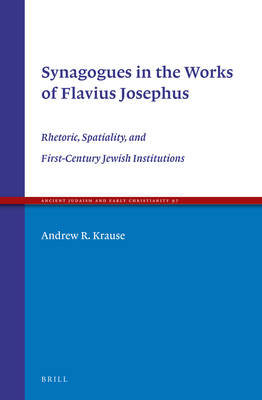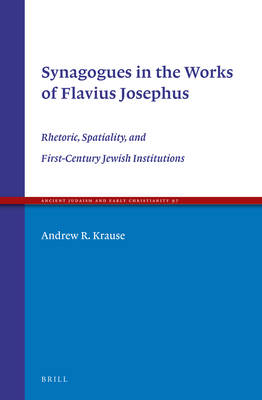
- Afhalen na 1 uur in een winkel met voorraad
- Gratis thuislevering in België vanaf € 30
- Ruim aanbod met 7 miljoen producten
- Afhalen na 1 uur in een winkel met voorraad
- Gratis thuislevering in België vanaf € 30
- Ruim aanbod met 7 miljoen producten
Zoeken
Synagogues in the Works of Flavius Josephus
Rhetoric, Spatiality, and First-Century Jewish Institutions
Andrew R Krause
€ 212,45
+ 424 punten
Omschrijving
In Synagogues in the Works of Flavius Josephus, Andrew Krause analyses the place of the synagogue within the cultural and spatial rhetoric of Flavius Josephus. Engaging with both rhetorical critical methods and critical spatial theories, Krause argues that in his later writings Josephus portrays the Jewish institutions as an important aspect of the post-Temple, pan-diasporic Judaism that he creates. Specifically, Josephus consistently treats the synagogue as a supra-local rallying point for the Jews throughout the world, in which the Jewish customs and Law may be practiced and disseminated following the loss of the Temple and the Land. Conversely, in his earliest extant work, Bellum judaicum, Josephus portrays synagogues as local temples in order to condemn the Jewish insurgents who violated them.
Specificaties
Betrokkenen
- Auteur(s):
- Uitgeverij:
Inhoud
- Aantal bladzijden:
- 280
- Taal:
- Engels
- Reeks:
- Reeksnummer:
- nr. 97
Eigenschappen
- Productcode (EAN):
- 9789004341821
- Verschijningsdatum:
- 23/02/2017
- Uitvoering:
- Hardcover
- Formaat:
- Genaaid
- Afmetingen:
- 155 mm x 236 mm
- Gewicht:
- 544 g

Alleen bij Standaard Boekhandel
+ 424 punten op je klantenkaart van Standaard Boekhandel
Beoordelingen
We publiceren alleen reviews die voldoen aan de voorwaarden voor reviews. Bekijk onze voorwaarden voor reviews.








